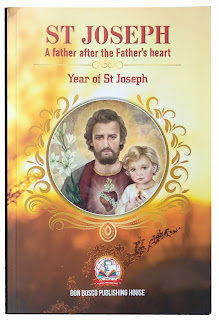A Day with Don Bosco
Don
Bosco was declared the Patron of Youth by Pope John Paul II in 1989. He
received his mission: to be Father to the young, in a dream at the tender age
of nine. He nurtured this call throughout his life and never wasted an
opportunity to gather boys and direct them to God. He did not do this as a
spiritual director, (at least no at first!) but rather as a friend, a companion
and a seminarian. As a young boy, he would attract youngsters with his magic
tricks, tightrope skills, games etc and then get them to recite the rosary with
him or recount to them the Sunday sermon (which he remembered thanks to his
prodigious memory). Already then, he had ingeniously found a way to combine
religion and entertainment. His entertainment was necer for entertainment sake
but rather a façade or an advertisment for religious instruction. Even as a
young priest, boys would long for more than just a wekkly encounter with him.
They loved him and found in him a friend who cared about them and a companion to
accompany them on life’s journey. Fr Pascual Chavez, rector major emeritus
wrote: “The mission consists not in merely doing things but in being signs of
the love of God in the world.” Don Bosco has left us a wonderful example.
Don
Bosco, after much trials and tribulations established his first oratory at the
Pinardi shed in April 1846. By then, he had over 400 boys with him. They were
mostly migrants in search of work in Turin .
Many had no families, no homes, no basic amenities. The oratory appealed to them
because there they got something to eat besides having a lot of fun.
A
typical day at the oratory would run thus: the boys would gather and begin to
play. Don Bosco and his helper priests would be available for confession.
Breakfast would be followed by classes and games. At the sound of the bugle,
all would congregate in the church for mass. After lunch, there would be catechism
followed by recreation, recitation of the rosary, after which the frolic
continued till it was night-fall at around which time the boys would disperse.
Picnics and outings would be organized regularly. For most of the boys the only
catechetical instruction they received was at the oratory. Thus, the oratory
became for them not only a meeting place or recreation centre but also a place
where: they learned to love God and live good Christian lives; they received
some education and training thus enabling them to get a job and they were
taught and encouraged to live as upright and concerned citizens.
Don
Bosco made such an impact on the boys that when he was at death’s door with an
illness, the boys prayed wholeheartedly for his recovery. Some even went to the
extent of making vows to Jesus and Mary, to give up food and other things if he
was cured. Despite the multitude of boys at the oratory, each boy would firmly
assert that Don Bosco loved him the most. Pope Pius XI said this of Don Bosco, ”He
was a spiritual mountain guide who led millions of youths to high levels of
Christian virtue, to the sanctification of work and to a holy way of life.” To
be with Don Bosco for even one day was an enriching experience extending over
all aspects of life: religious, social, cultural, intellectual and physical.
Charles Decroix, a past pupil said, “Don Bosco’s activity can be summed up in
these principles: entertain in order to instruct; assist in order to educate;
awaken curiosity in order to get attention; respond to the needs of this life
in order to keep in mind the promises of eternal life.”
Thus,
we have seen how Don Bosco tried to instill religious fervour in the hearts of
youngsters by using various means. A day spent with Don Bosco was never wasted.
It was very beneficial and as a result, many youngsters longed to be with him.
Archbishop Colli had said, “Our tormented modern society hungers more for God
than for bread, has greater need of Saints than warriors; it needs a greater
amount of prayer sites, of schools of faith and sacrifice, of hospitals where
souls may be healed and it has greater need of beacons of the light of
charity.” Don Bosco strove to accomplish this in his lifetime. His legacy is
carried on by his followers, the Salesians. Let us imitate the example set by
Don Bosco as we encounter young people in various settings. Let us make each
day an enriching and fulfilling experience, blending the secular with the
sacred and living as good Christians and honest citizens.
Cl Ian Pinto sdb


Excellent article Ian! Read it on the Renewal(Renovacao) magazine. Absolutely loved it! We are always there to support you! Keep up the good work! :D
ReplyDelete